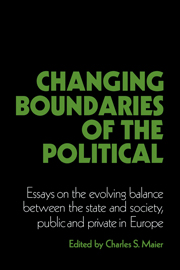 Changing Boundaries of the Political
Changing Boundaries of the Political Published online by Cambridge University Press: 05 June 2012
“Am I both priest and clerk? Well then, amen.”
Shakespeare, The Tragedy of King Richard II, IV. 1.173Absolute politics and the reflexive power of politics
Behind the idea of politics having boundaries, and of these dilating and contracting, it is not hard to discover, in both individual and collective representations, the image of a state of affairs – and the hope for or terror of it – where no boundaries at all are set around the practice of political commitment and the exercise of political will. Everything social would then be placed sub specie politicae, interpreted through politics and seen as transformable by politics. I will call “absolute politics” the state of affairs reflected in that image. It will be the object of this inquiry. This will therefore deal with the circumstances under which politics can be seen as the type of activity entitled to dictate the rules of conduct for all relevant social activities, while these, in turn, are being evaluated essentially for the political consequences they may bear. Under such circumstances political action can be seen as the only type of action capable of transforming society and therefore the only one through which the life of humanity, or of a nation, can be improved to approximate a given ideal. Political vocation as well as participation in politics are predicated as the highest of possible individual choices. They dictate to a person aims which will prevail over those dictated by his or her own self-interest.
To save this book to your Kindle, first ensure [email protected] is added to your Approved Personal Document E-mail List under your Personal Document Settings on the Manage Your Content and Devices page of your Amazon account. Then enter the ‘name’ part of your Kindle email address below. Find out more about saving to your Kindle.
Note you can select to save to either the @free.kindle.com or @kindle.com variations. ‘@free.kindle.com’ emails are free but can only be saved to your device when it is connected to wi-fi. ‘@kindle.com’ emails can be delivered even when you are not connected to wi-fi, but note that service fees apply.
Find out more about the Kindle Personal Document Service.
To save content items to your account, please confirm that you agree to abide by our usage policies. If this is the first time you use this feature, you will be asked to authorise Cambridge Core to connect with your account. Find out more about saving content to Dropbox.
To save content items to your account, please confirm that you agree to abide by our usage policies. If this is the first time you use this feature, you will be asked to authorise Cambridge Core to connect with your account. Find out more about saving content to Google Drive.